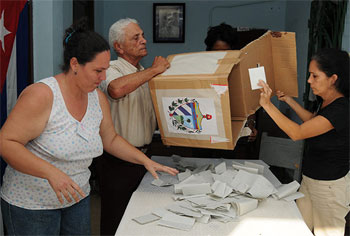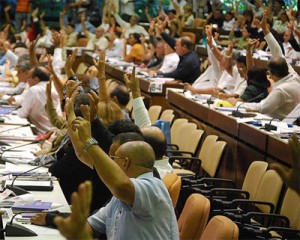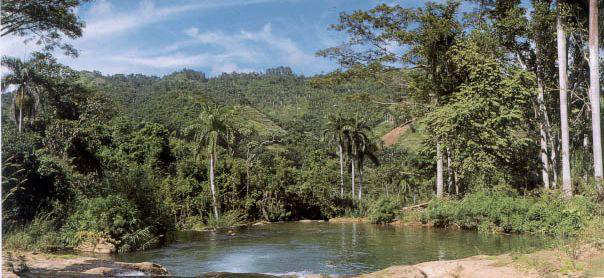A criticism from Within
Cuba has just concluded its general elections, and in their wake is the reflection of Guillermo Rodriguez, a revolutionary intellectual who is questioning some aspects of his country’s electoral system and is calling for more and better opportunities for participation.
Rodriguez is critical of there being no election campaigns in Cuba. “Not only do we not finance political campaigns, but we don’t even have political campaigns. Perhaps it’s because those are associated with ‘politicking’ – where candidates promise things they know they can’t deliver.”
He recalls that prior to 1959 the island politicians would lie to the electorate to win their votes – as is the case today in other countries. However, the Cuban intellectual believes that “eliminating political campaigns in order to eliminate politicking is like throwing out the baby with the bathwater.”
“In Cuba, all candidate promotion and ads are banned. All that’s permitted is a brief biography of the candidate along with a small ID photo.”
Nonetheless, Rodriguez insists that citizens are “interested more in knowing what each candidate proposes to do as a deputy or what their projects would be as a legislator.”
Another criticism expressed in the article has to do with the district representation that parliament should observe. Many deputies are elected to represent places they haven’t lived in for decades – and in some cases they’ve never lived there.
“It’s absurd for there to be a deputy from Sagua de Tanamo who hasn’t visited the town in a year,” maintains the intellectual. He argues that a deputy to parliament “should know the problems, deficiencies, and needs of their region and their constituents, and they need to address those through legislation.”
“The economy is crying for decentralizing; the country needs a political life,” he said. “Little or no attention is paid to the Cuban legislators since they can’t address the problems that affect and sometimes overwhelm their constituents.”
To make matters worse, the image portrayed for decades on Cuban TV has been that of a parliament that limits itself to unanimously “legalizing” each of the measures announced by the executive.
Cubans have never seen a deputy questioning a ministerial or executive report.
Electors in Cuba must vote for their representatives from a list that indicates a single candidate for each position. The citizen doesn’t have the option of choosing between one candidate or another. The most they can do is not vote for those they don’t like.
Consequently, Rodriguez says, “If the voter doesn’t have anyone to select from, the (Candidature) Commission is the entity that determines the makeup of the Assembly (…) In practice, it’s the Candidature Committee that elects the deputies.”
He also questions the inclusion of 50 percent of the candidates not being elected (at the local level) by the public. “That’s too much, when in fact most of them are government officials. I think it diminishes the critical capacity of the National Assembly to assess the performance of government.”
Given this, he proposes a rather moderate change. He suggests Cuban parliament increase its representativeness by including “individuals of recognized prestige and those without commitments to the government, though they could be members of the Communist Party.”
Rodriguez concludes his article asserting that “the adoption of these measures would significantly expand the democratic nature of our elections and thus strengthen the links between the public and their representatives. It would do us good.”
Apparently he’s not the only one who thinks this way. His analysis was reproduced in several leftist Cuban blogs, including Segunda Cita, by singer-songwriter Silvio Rodriguez.
Apparently, now the criticism is coming from within the revolution, and it’s being expressed by those who continue to support socialism.
Sources:BBC-UK/FernandoRavsberg/HavanaTimes/RPerezPhotos/www.thecubanhistory.com
Una crítica desde dentro/ The Cuban History/ Arnoldo Varona, Editor
UNA CRITICA DESDE ADENTRO.
Cuba acaba de realizar sus elecciones nacionales y tras ellas queda la reflexión de Guillermo Rodríguez, un intelectual revolucionario, que cuestiona algunos aspectos del sistema electoral de su país, reclamando mayores y mejores espacios de participación popular.
Critica Rodríguez que en Cuba no haya campaña electoral, “no solo no tenemos financiamiento de las campañas políticas, sino que no tenemos campañas políticas. Acaso porque estaban asociadas a esa deformación que es la ‘politiquería’: el candidato prometía lo que sabía que no iba a cumplir”.
Recuerda que antes a 1959 -igual que ocurre hoy en otros países- los políticos de la isla mentían a los electores para ganar sus votos pero cree el intelectual cubano que “eliminar las campañas políticas para eliminar la politiquería, es como botar el agua sucia de la palangana con niño y todo”.
En Cuba está prohibida toda propaganda política, solo se permite exponer una breve biografía de los candidatos con una foto carnet.
Sin embargo, Guillermo Rodríguez asegura que al ciudadano le “interesaría más conocer qué se propone hacer como diputado, cuáles son sus proyectos como legislador”.
Otro cuestionamiento expresado en el artículo tiene que ver con la composición territorial que debería observar el parlamento. A pesar de esto muchos diputados son electos por territorios donde hace décadas que no viven y en algunos casos donde nunca han residido.
“Es absurdo que exista un diputado por Sagua de Tánamo que no haya visitado la localidad en un año” sostiene el intelectual y argumenta que un parlamentario “debe conocer los males, las carencias, las necesidades de su región, de su pueblo, y hacerlos presentes allí donde legisla”.
“La descentralización que la economía pide a gritos, la necesita a todo dar la vida política del país”, dice y concluye afirmando que “la poca o casi nula atención que el cubano presta a sus legisladores, proviene del hecho de que no pueden resolver los problemas que afectan y a veces agobian al ciudadano”.
Para empeorar las cosas, la imagen que la TV cubana ha transmitido durante décadas es la de un parlamento que se limita a “legalizar” de forma unánime cada una de las medidas anunciadas por el gobierno.
Nunca los cubanos han visto a un diputado cuestionar los informes ministeriales o del ejecutivo.
En Cuba los electores deben votar a sus diputados sobre una lista única en la que figura un solo candidato para cada puesto. El ciudadano no tiene la opción de elegir entre una y otra persona, lo más que puede hacer es no votar por los que no sean de su agrado.
En este sentido Guillermo Rodríguez asegura que “si el elector no tiene dónde seleccionar, la Comisión (de candidatura) es entonces la que decide cómo se integra la Asamblea (…) en la práctica, es la Comisión de Candidatura la que está eligiendo a los diputados”.
Cuestiona también que se incluya a un 50% de candidatos no electos por la población “son demasiados cuando, de hecho, la mayor parte de ellos son funcionarios del gobierno. Creo que ello disminuye la capacidad crítica de la Asamblea Nacional para valorar la actuación del gobierno”.
En este sentido propone un cambio bastante moderado: que el parlamento cubano aumente su representatividad incluyendo a “personalidades de reconocido prestigio y saber que no tengan ese compromiso con el gobierno, aunque puedan ser militantes del PCC”.
Finaliza Rodríguez su artículo asegurando “que adoptar estas medidas ampliarían sensiblemente el carácter democrático de nuestras elecciones y en consecuencia reforzaría los vínculos entre la población y sus representantes. Bien nos va a hacer”.
Al parecer no es el único que lo cree porque su análisis fue reproducido por varios blogs cubanos de izquierda, entre ellos “Segunda Cita”, del cantautor Silvio Rodríguez.
Al parecer esta vez la crítica viene desde dentro de la Revolución y es expresada por quienes siguen apoyando el socialismo.
Sources:BBC-UK/FernandoRavsberg/HavanaTimes/RPerezPhotos/www.thecubanhistory.com
Una crítica desde dentro/ The Cuban History/ Arnoldo Varona, Editor



 Letters from Cuba (Feb.16,13) * Cartas desde Cuba (02/16/13).
Letters from Cuba (Feb.16,13) * Cartas desde Cuba (02/16/13).

